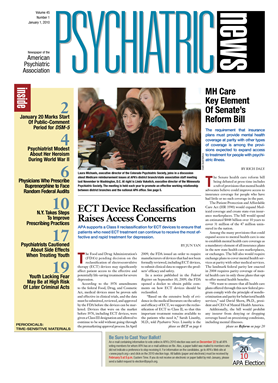California's recent experience with a state insurance parity law indicates that federal regulators must carefully monitor insurers' implementation of the landmark 2008 federal parity law, according to a group of federal and private health care policy researchers.
Researchers from Mathematica Policy in Cambridge, Mass., and the Substance Abuse and Mental Health Services Administration concluded that federal oversight of the implementation of the Paul Wellstone and Pete Domenici Mental Health Parity and Addiction Equity Act (PL 110-343) should include monitoring insurers that offer mental health coverage to ensure that they do so at parity with other medical benefits. That oversight should include examinations of the ways in which insurers provide access and quality care to beneficiaries, while monitoring coverage and costs. Those examinations should encompass insurers' efforts to cover the breadth of mental health diagnoses. Additionally, regulators should mount a consumer education campaign about those insurance benefits.
The recommendations stemmed from an examination of the effectiveness of California's implementation of its state parity law. The study, led by Margo Rosenbach, Ph.D., was published in the December 2009 Psychiatric Services.
The California parity law, implemented in 2000, required insurance plans to offer mental health coverage for specified diagnoses and eliminate mental health benefit limits and cost-sharing requirements that were less comprehensive than those for other medical conditions.
The five-year study, which used sample interviews with consumers, providers, and insurers, found that the dominant health insurers in the state complied with the provisions of the parity law. Insurers were able to limit costs through the use of “medical necessity” criteria, which use predetermined criteria to decide whether insurers will authorize additional visits or days of coverage for psychiatric diagnoses.
An examination of additional regulatory oversight provided by Vermont state health officials implementing a similar mental health parity law found they used increased oversight of insurers by mandating new annual reporting requirements and quality standards for the five largest health plans operating in the state. The goal of the Vermont regulations was to increase “accountability” for insurers by tracking the actual delivery of promised mental health coverage.
Access, Quality Must Be Measured
The findings “suggest that monitoring of health plan performance should include measures of access and quality, as well as coverage and costs,” the researchers wrote.
The federal parity law allows health plans to determine which diagnoses they cover, and they are not prohibited from excluding coverage for a specific diagnosis under the terms of its coverage contract with an employer. However, regulators are required to monitor the extent to which health plans exclude coverage for specific diagnoses.
The researchers concluded that California's experience indicates that such exclusions would not help contain costs but could produce unintended consequences, such as beneficiary delays in seeking treatment and incentives for inaccurate “upcoding” by clinicians to more severe diagnoses.
The researchers concluded, based on interviews with insurance executives, that the use of managed care and medical necessity determinations allowed insurers to achieve sustainable cost control under the state parity law. The researchers also noted that consumers tended to have little knowledge about parity.
“The limited awareness about parity in California was attributed to the lack of a systematic effort to inform consumers about the law,” the researchers noted.
Such an educational campaign could help first-time mental health service users who may not be aware of their mental health benefits. An added benefit of such public outreach could be a reduction in the stigma associated with mental illness, they said.
Federal Implementation Efforts Lag
The guidance for the regulatory implementation of the federal parity law comes as federal health care officials are expected to issue rules for its implementation this month. The law requires full parity coverage for mental health conditions, including benefit limits and cost sharing. The law affects 113 million beneficiaries, including 82 million in self-insured health plans that can be exempt from state parity laws, such as the ones in California and Vermont.
Federal officials failed to meet an October 2009 deadline to issue regulations guiding the implementation of the federal law. Nonetheless, the law became effective January 1. Kathleen Sebelius, secretary of Health and Human Services (HHS), told congressional leaders last October that the regulations would be issued this month (Psychiatric News, November 6, 2009).
Federal officials said the delay in the rules followed extensive comments from the public about the parity law. Sebelius said that HHS, the Labor Department, and the Treasury Department, which are jointly responsible for implementing the parity law, received more than 400 written comments from mental health stakeholders and the public on various aspects of the law last year.
The delay did not surprise some mental health experts, who said insufficient time was allowed to address comprehensively the complex issues involved.
In the meantime, federal health officials directed insurers to make reasonable efforts to adhere to the law's intent in the absence of regulations, according to mental health advocates.
Among the regulatory efforts recommended by James H. Scully Jr., M.D., medical director of APA, in a May 2009 letter to the HHS, Labor, and Treasury secretaries, was the use of “real-time monitoring of insurance coverage and management practices.” Such an approach, similar to those urged by the authors of the recent California parity study, would allow regulators to identify and quickly address abuses of the parity law.
